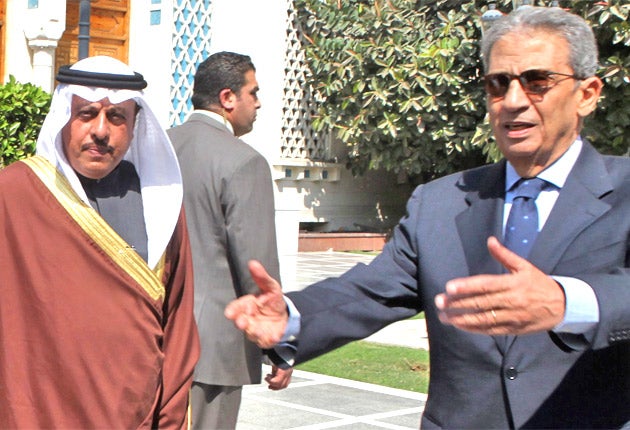Arab League: Support back on board, but consensus remains far from firm

Your support helps us to tell the story
From reproductive rights to climate change to Big Tech, The Independent is on the ground when the story is developing. Whether it's investigating the financials of Elon Musk's pro-Trump PAC or producing our latest documentary, 'The A Word', which shines a light on the American women fighting for reproductive rights, we know how important it is to parse out the facts from the messaging.
At such a critical moment in US history, we need reporters on the ground. Your donation allows us to keep sending journalists to speak to both sides of the story.
The Independent is trusted by Americans across the entire political spectrum. And unlike many other quality news outlets, we choose not to lock Americans out of our reporting and analysis with paywalls. We believe quality journalism should be available to everyone, paid for by those who can afford it.
Your support makes all the difference.The Arab League is expected to reaffirm its backing for the no-fly zone over Libya after its vacillations in the past two days threatened to undermine a Western strategy conditioned on regional support.
The 22-member body held an emergency meeting in Cairo yesterday to discuss the crisis in a key test of its resolve in backing military intervention aimed at protecting Libyan citizens from air strikes ordered by Colonel Muammar Gaddafi.
Amr Moussa, the Egyptian chief of the Arab League, rattled Western leaders when he expressed his concerns on Sunday that the air strikes would not protect civilians but endanger them. His comments underscored the unease felt by several Arab countries over the scale of the military intervention, which has seen allied aircraft bomb key defensive installations.
The apparent unravelling of Arab League resolve caused consternation in Western capitals, which reluctantly endorsed military action on the understanding that it had the full backing of the League.
The US, France and Britain were only able to push through a UN resolution after the Arab League called for a no-fly zone in response to reports that pro-regime troops in Libya had started their assault on Benghazi, the centre of the rebel administration which opposes Gaddafi's 42-year rule.
Following urgent US diplomacy and a hastily arranged meeting on Monday with Ban Ki-moon, UN Secretary General, Amr Moussa appeared to be back on board, reiterating his support for the UN Resolution 1973, saying: "We have no objection to this decision, particularly as it does not call for an invasion of Libyan territory."
But Arab countries still remain deeply divided over a no-fly zone in Libya; some of them shocked by televised images of heavy bombardments by fighter jets, while countries such as Yemen, which has tried to suppress a popular revolt, may be wondering if the same fate awaits them.
Arab League member Algeria has called for an "immediate cessation" of foreign intervention, arguing the military coalition has gone beyond the UN mandate, while the United Arab Emirates, which had been expected to provide warplanes, has limited itself to humanitarian assistance.
But Abdul Rahman bin Hamad al-Attiyah, Secretary-General of the Gulf Co-operation Council, tried to allay fears, saying that the military intervention was not an invasion of an Arab country. "What is happening now is not an intervention. It is about protecting the people from bloodshed," he said.
Qatar is so far the only Arab League country to provide concrete military assistance, sending four jets to the region. Egypt, which has a large air strike capability, has declined to enter the fray, citing its own internal problems in the wake of last month's ousting of Hosni Mubarak. Saudi Arabia, which also has a well-equipped air force, is yet to decide either way. With the initial bombing phase now largely completed, Britain is understood to be working behind the scenes to persuade more Arab countries to join the military coalition.
Broader Arab support will help offset US fears about being seen to start another war in the region and Washington is expected to transfer US control of operations within the next few days, saying that Nato would have a co-ordinating role.
France has argued against Nato taking command, saying that it could frighten off Arab nations, who view the 28-member alliance as being dominated by the United States.
Middle East reaction...
* Egypt's Al Masry Al-Youm said that Western powers were seen by many as "opportunist interventionists" and asked "Why can't Turkey, Egypt, South Africa, Brazil, and India enforce a no-fly zone in Libya? Hasn't the time come for these countries to shape a new security order."
* The Daily Star in Lebanon attacked Arab leaders for "hypocrisy" over Libya. It argued the intervention "amounted to another disgrace for a region where the people are finally rising up against their leaders' seemingly boundless capacity for ineptitude".
* An online poll for The Jordan Times showed that 67 per cent supported the intervention. "In this part of the world, we are accustomed to being sceptical of American military interventions [but] the British-American-French military measures taken so far against the butcher of Libya are widely welcomed by the Arab masses."
Join our commenting forum
Join thought-provoking conversations, follow other Independent readers and see their replies
Comments